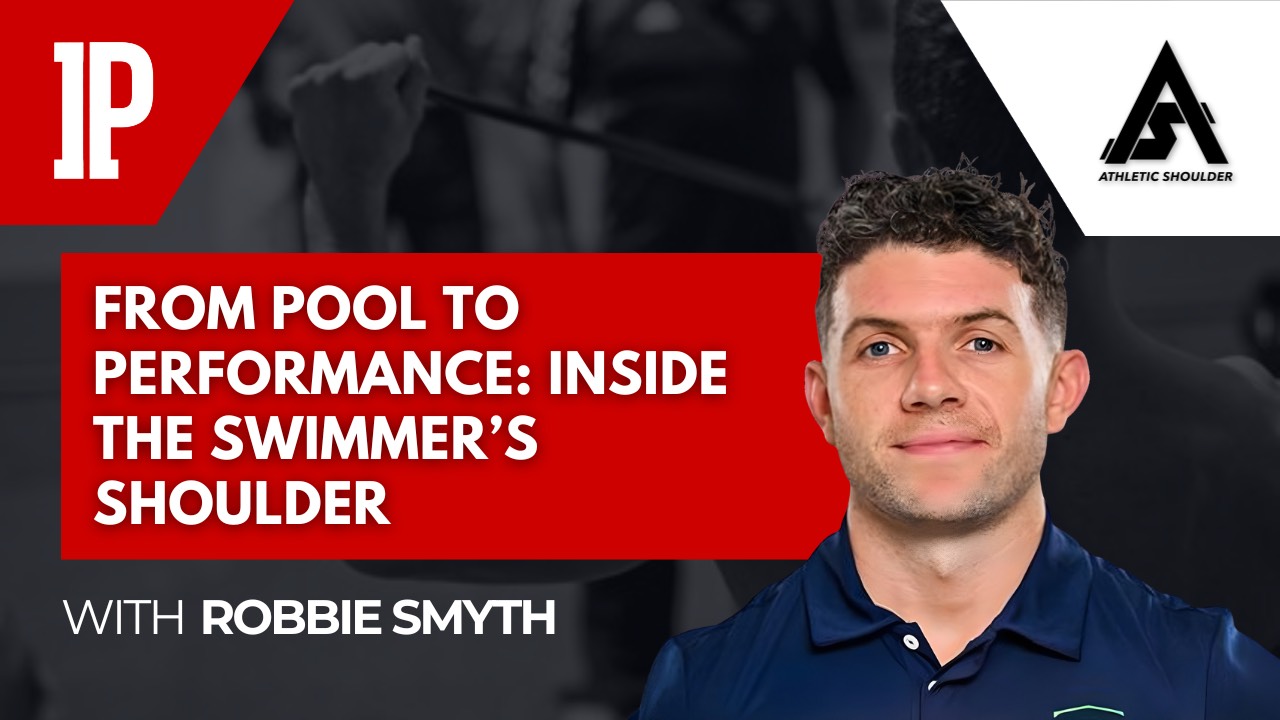Robbie Smyth: From Pool to Performance: Inside the Swimmer’s Shoulder
Oct 27, 2025
Episode 202: In this episode of the Athletic Shoulder Podcast, host Ben Ashworth is joined by Robbie Smyth, a Sports Physiotherapist currently working with the Sport Ireland Institute, where he serves as Lead Physiotherapist for the national swimming program.
Robbie has extensive experience across elite sport, having previously worked with Athletics Ireland, the Ireland National Team at the Paris Olympics, and as a Senior Physiotherapist with Meath GAA. His work focuses on bridging the gap between performance and rehabilitation for athletes competing at the highest level.
In this conversation, Robbie shares insights from his experience supporting world-class swimmers and discusses the nuanced demands of managing shoulder health in aquatic athletes.
Topics Discussed:
- Challenges in Olympic-level swimming
- Screening and assessment techniques
- Injury prevention strategies for swimmers
- Integrating dry-land and water-based training
- Managing shoulder pain and hypermobility
- Kinetic chain and force transfer in swimmers
- Surgical vs conservative management
- Future directions in swimmer rehabilitation
Key Points:
-
Swimmers are categorized as overhead athletes, but they face unique challenges due to the high volume of shoulder revolutions, often reaching millions per year. This necessitates a delicate balance between in-water and out-of-water training to prevent shoulder pain, which affects up to 91% of swimmers. The goal is to mitigate pain rather than eliminate it, as complete prevention is unrealistic.
-
A comprehensive screening process is crucial, involving movement screenings and strength tests like the Ash test. This helps identify potential breakdown points in swimmers. The focus is on understanding each athlete's normal range and identifying deviations that could lead to injury, particularly in the shoulder and thoracic spine.
-
Swimmers often exhibit localized or generalized hypermobility due to early specialization. The key is to understand what is normal for each athlete and address any deficits in movement or strength that could lead to shoulder pain. This involves assessing the interaction between the scapula and thoracic spine and ensuring proper kinetic chain integration.
-
Effective rehab involves a mix of open and closed chain exercises to enhance shoulder stability. Techniques like bottoms-up kettlebell presses and Swiss ball rollouts are used to improve overhead stability and proprioception. The aim is to challenge the shoulder in vulnerable positions to build resilience against high training volumes.
-
For sprinters, peak force production is critical, while endurance is more important for long-distance swimmers. Testing should reflect these differences, with sprinters focusing on force production metrics and endurance athletes on sustained force output. This helps tailor training and rehab to the specific needs of each athlete.
-
Proper coordination and technique are essential to prevent shoulder pain. Issues like poor thoracic spine mobility or unilateral breathing can lead to compensatory movements and increased shoulder stress. Addressing these through targeted exercises can alleviate pain and improve performance.
-
Managing training loads is vital, especially during periods of increased intensity or volume. Weekly meetings with coaches help plan and adjust training blocks to prevent overload. Understanding each swimmer's history and capabilities allows for proactive adjustments to training loads.
-
Early intervention and proactive measures are key to preventing shoulder injuries. This includes regular screenings, individualized training plans, and close monitoring of training loads. The focus is on maintaining a balance between training demands and the athlete's capacity to handle them.
-
Surgery is rarely recommended for swimmers due to the potential impact on shoulder mechanics. Instead, a conservative approach focusing on functional rehabilitation and pain management is preferred. This involves understanding the underlying causes of pain and addressing them through targeted interventions.
-
Staying updated with the latest research and techniques is crucial for effective shoulder rehab. This includes exploring new testing methods and adapting training protocols based on emerging insights. Collaboration with other professionals and ongoing education help refine approaches to shoulder rehabilitation in swimmers.
Sponsors
VALD Performance, makers of the Nordbord, Forceframe, ForeDecks and HumanTrak. VALD Performance systems are built with the high-performance practitioner in mind, translating traditionally lab-based technologies into engaging, quick, easy-to-use tools for daily testing, monitoring and training
Hytro: The world’s leading Blood Flow Restriction (BFR) wearable, designed to accelerate recovery and maximise athletic potential using Hytro BFR for Professional Sport.




